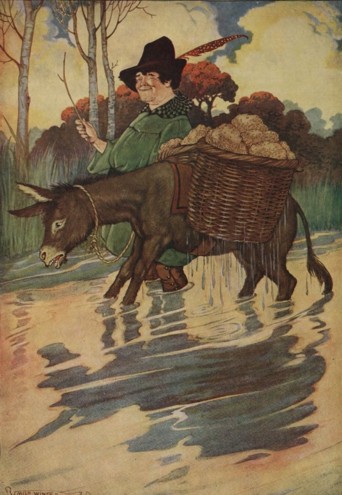| 1. merchant | /MUR-chuhnt/ |
| -a person who buys and sells commodities for profit; dealer; trader | |
| The market is full of merchants every day. | |
| 2. delight | /dih-LAHYT/ |
| -something that gives great pleasure | |
| It was a delight to see the dancers on stage. | |
| 3. burden | /BUR-dn/ |
| -a heavy load that you carry | |
| The horse carried a lot of burdens. | |
| 4. purposely | /PUR-puhs-lee/ |
| -intentionally | |
| He purposely doesn’t ride trains during rush hours. | |
| 5. shallow | /SHAL-oh/ |
| -of little depth; not deep | |
| The pool was too shallow for adults. |

A Merchant, driving his Ass homeward from the seashore with a heavy load of salt, came to a river crossed by a shallow ford. They had crossed this river many times before without accident, but this time the Ass slipped and fell when halfway over. And when the Merchant at last got him to his feet, much of the salt had melted away. Delighted to find how much lighter his burden had become, the Ass finished the journey very gayly.
Next day, the Merchant went for another load of salt. On the way home, the Ass, remembering what had happened at the ford, purposely let himself fall into the water, and again got rid of most of his burden.
The angry Merchant immediately turned about and drove the Ass back to the seashore, where he loaded him with two great baskets of sponges. At the ford, the Ass again tumbled over; but when he had scrambled to his feet, it was a very disconsolate Ass that dragged himself homeward under a load ten times heavier than before.
The same measures will not suit all circumstances.
| 1. | What happened to the Ass and the Merchant while crossing the river? |
| 2. | Why did the Ass feel delighted after the accident? |
| 3. | What did the angry Merchant do after the accident? |
| 1. | In your opinion, what did the Merchant do wrong in the story? |
| 2. | How should we practice to become content with what we have? |
| 3. | In your opinion, how can you teach other people to not be greedy? |
| 4. | How do you reflect the story with your life? |
| 5. | Please explain the moral of the story using your understanding. |
| Grammar 文法 |
Pronunciation 発音 | Vocabulary 単語 |
Comprehension 理解 |
|
|---|---|---|---|---|
 GOOD GOOD |
文法の誤りはほとんどなく、完全な文章で話すことができる | ほとんどの単語をはっきりと正しく発音することができる | 習った表現を適切に使うことができる | 文章を理解し、質問に正しく答えることができる |
 FAIR |
文法の誤りはあるが、完全な文章で話すことができる | 発音の練習が必要な言葉がいくつかある | たまにミスはあるが、習った表現を適切に使うことができる | 文章を完全に理解するのは難しく、質問に正しく答えられないときもある |
 POOR |
文章で話すのは難しく、単語だけで話すことができる | 発音の練習が必要である | 習った単語と表現を少しだけ使うことができる | 文章を理解するのは難しく、質問に答えるのは難しい |
An eBook from The Project Gutenberg.
This eBook is for the use of anyone anywhere at no cost and with almost no restrictions whatsoever. You may copy it, give it away or re-use it under the terms of the Project Gutenberg License included with this eBook or online at www.gutenberg.org